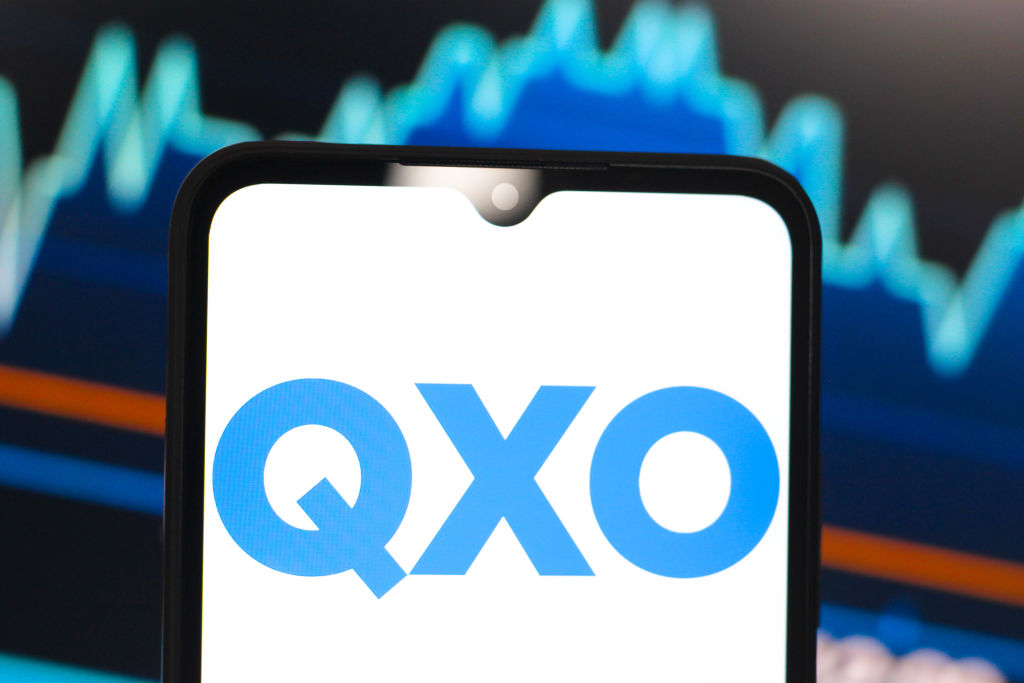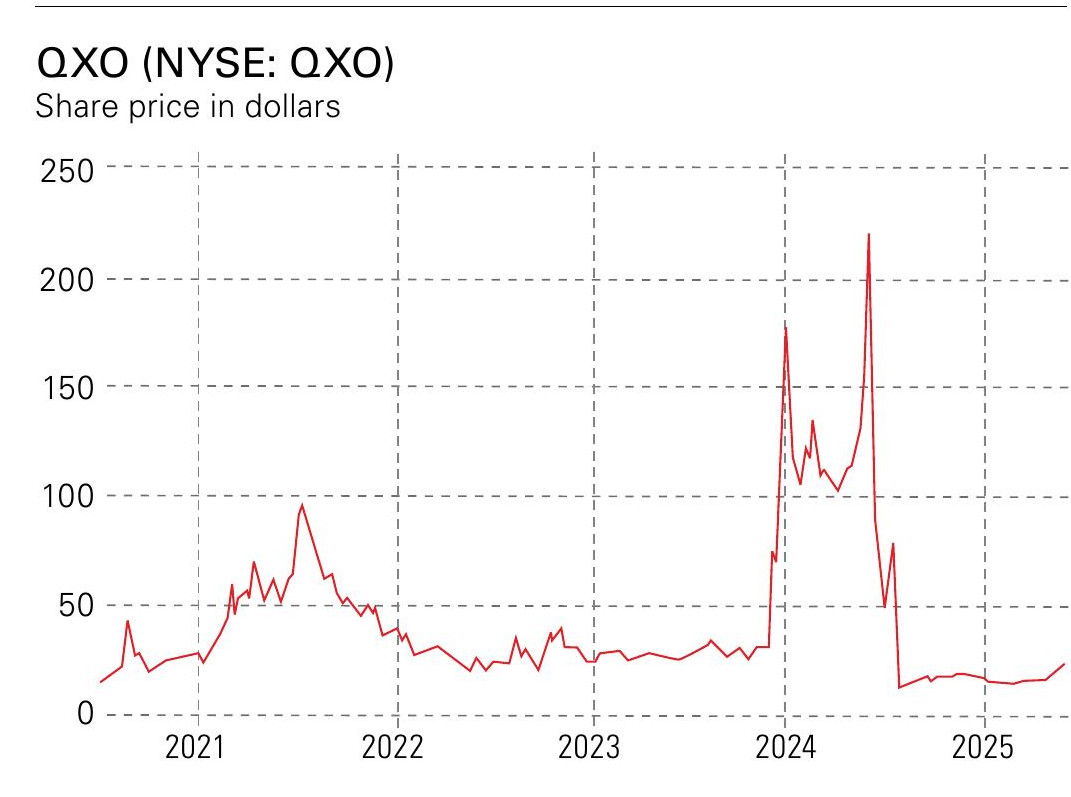QXO: a compelling opportunity in the building materials industry
The boss of QXO knows how to make a few billion dollars, and aims to repeat the trick. Investors would be wise to back him, says Jamie Ward

Get the latest financial news, insights and expert analysis from our award-winning MoneyWeek team, to help you understand what really matters when it comes to your finances.
You are now subscribed
Your newsletter sign-up was successful
Want to add more newsletters?

Twice daily
MoneyWeek
Get the latest financial news, insights and expert analysis from our award-winning MoneyWeek team, to help you understand what really matters when it comes to your finances.

Four times a week
Look After My Bills
Sign up to our free money-saving newsletter, filled with the latest news and expert advice to help you find the best tips and deals for managing your bills. Start saving today!
In the vast and fragmented world of building-materials distribution, a new player is emerging with bold ambitions to reshape the industry.
QXO launched in 2023 and aims to become a market leader in an $830 billion sector that supplies everything from lumber to roofing for homes, offices and infrastructure projects.
Led by serial entrepreneur Brad Jacobs, whose record of transforming industries is unmatched, QXO is poised to capitalise on powerful growth trends and deliver substantial value for shareholders. With a strategy rooted in acquisitions, technology and scale, QXO offers a compelling opportunity to back a visionary leader in a market ripe for consolidation.
MoneyWeek
Subscribe to MoneyWeek today and get your first six magazine issues absolutely FREE

Sign up to Money Morning
Don't miss the latest investment and personal finances news, market analysis, plus money-saving tips with our free twice-daily newsletter
Don't miss the latest investment and personal finances news, market analysis, plus money-saving tips with our free twice-daily newsletter
QXO has ambitious plans
QXO’s product range spans doors, windows, plumbing, roofing and more, catering for new construction and renovation projects. Unlike traditional distributors, QXO prioritises technology, aiming to streamline supply chains with AI, e-commerce and automation. It was launched through a $1 billion investment into SilverSun Technologies, which was renamed QXO after spinning off its software business. QXO’s strategy is to consolidate the fragmented building-materials sector through acquisitions and internal upgrades. Its ambitious plan is to use its scale advantage to enhance customer service, boost sales efficiency and expand margins.
By integrating advanced tools such as AI-driven pricing and warehouse robotics, QXO aims to modernise an industry where e-commerce currently accounts for just 5% of revenue. Its first major acquisition was Beacon Roofing Supply, valued at $11 billion. With this, QXO has already established a strong foothold, positioning itself as a transformative force.
The building-materials distribution industry is a cornerstone of global construction, generating hundreds of billions in annual revenue. It serves a diverse customer base, from contractors building homes to developers upgrading infrastructure – a booming industry.
It is a fragmented market, with about 20,000 distributors across North America, creating opportunities for consolidation. There are some large businesses operating already, but most distributors remain small, lacking the resources to invest in advanced technology. QXO’s tech-focused approach positions it to capture market share by offering improved efficiency and value-added services such as digital order tracking.
Brad Jacobs is a visionary boss
Brad Jacobs, QXO’s chairman and CEO, is a billionaire entrepreneur renowned for building multi-billion-pound companies from scratch. With a career spanning four decades, Jacobs has a knack for identifying fragmented industries and transforming them through scale, technology and acquisitions. His leadership style, detailed in his 2024 book How to Make a Few Billion Dollars, emphasises the importance of hiring top talent, fostering innovation and delivering value for shareholders.
At 68, Jacobs remains a dynamic force, running QXO and chairing XPO, GXO Logistics, and RXO. Jacobs’ reputation draws top executives – QXO’s leadership team includes former XPO and GXO veterans. His ability to attract talent and capital reflects investors’ confidence in his vision. Jacobs’ hands-on approach and focus on technology make him the ideal leader to steer QXO towards its long-term goals.
Jacobs has founded and scaled five multi-billion-pound public companies, completing more than 500 mergers and acquisitions and raising about $30 billion in capital. His first major success was United Waste Systems, where he consolidated regional waste firms, achieving a 55% compound annual growth rate before selling to Waste Management in the 1990s. United Rentals, the world’s largest equipment rental firm, followed a similar playbook, combining rapid acquisitions with new branches to dominate a fragmented market.
In logistics, Jacobs transformed XPO into a global leader specialising in transport involving less than a truck load, later spinning off GXO (contract logistics) and RXO (freight brokerage). In total, his ventures have delivered tens of billions of dollars in value for shareholders over the past 35 years.
Each success has relied on the same formula – target fragmented industries, acquire strategically, integrate with technology and drive efficiency. At XPO, Jacobs introduced data-driven logistics tools, boosting margins and customer satisfaction. This proven strategy underpins QXO’s plan to unify building-materials distribution, leveraging Beacon’s nationwide footprint to expand into adjacent markets.
Get in early
QXO trades at only a little more than net asset value, despite already demonstrating the benefits of the improvements brought to its newly acquired companies. The industry’s fragmentation allows QXO to acquire smaller firms cheaply, integrating them to unlock cost savings and synergies.
QXO’s “tech-forward” strategy addresses the industry’s lag in digital adoption and aligns with market trends, with e-commerce projected to triple by 2030, and driven by contractors seeking seamless ordering.
QXO’s acquisition strategy will amplify growth. Unlike XPO’s gradual ramp-up, QXO targets big players from the start, with Beacon providing a large foundation. Jacobs aims for $50 billion in revenue by capturing just 6% of the $830 billion market, a feasible goal given his history. Early shareholders could see substantial rewards. QXO is a standout opportunity in today’s market.

This article was first published in MoneyWeek's magazine. Enjoy exclusive early access to news, opinion and analysis from our team of financial experts with a MoneyWeek subscription.
Get the latest financial news, insights and expert analysis from our award-winning MoneyWeek team, to help you understand what really matters when it comes to your finances.
Jamie is an analyst and former fund manager. He writes about companies for MoneyWeek and consults on investments to professional investors.
-
 Reach for the stars to boost Britain's space industry
Reach for the stars to boost Britain's space industryopinion We can’t afford to neglect Britain's space industry. Unfortunately, the government is taking completely the wrong approach, says Matthew Lynn
-
 Properties for sale with beautiful kitchens
Properties for sale with beautiful kitchensThe best properties for sale with beautiful kitchens – from a Modernist house moments from the River Thames in Chiswick, to a 19th-century Italian house in Florence
-
 Three key winners from the AI boom and beyond
Three key winners from the AI boom and beyondJames Harries of the Trojan Global Income Fund picks three promising stocks that transcend the hype of the AI boom
-
 Three companies with deep economic moats to buy now
Three companies with deep economic moats to buy nowOpinion An economic moat can underpin a company's future returns. Here, Imran Sattar, portfolio manager at Edinburgh Investment Trust, selects three stocks to buy now
-
 Beeks – building the infrastructure behind global markets
Beeks – building the infrastructure behind global marketsBeeks Financial Cloud has carved out a lucrative global niche in financial plumbing with smart strategies, says Jamie Ward
-
 Three promising emerging-market stocks to diversify your portfolio
Three promising emerging-market stocks to diversify your portfolioOpinion Omar Negyal, portfolio manager, JPMorgan Global Emerging Markets Income Trust, highlights three emerging-market stocks where he’d put his money
-
 Coface offers excess profit in an unloved sector
Coface offers excess profit in an unloved sectorCoface is a world leader in trade-credit insurance with key competitive advantages in a niche market
-
 Profit from pest control with Rentokil Initial
Profit from pest control with Rentokil InitialRentokil Initial is set for global expansion and offers strong sales growth
-
 Three funds to buy for capital growth and global income
Three funds to buy for capital growth and global incomeOpinion Three investment trusts with potential for capital growth, selected by Adam Norris, co-portfolio manager of the CT Global Managed Portfolio Trust
-
 PayPoint: a promising stock for income-seekers
PayPoint: a promising stock for income-seekersPayPoint, a household name across Britain, is moving away from its traditional roots toward a digital future. Investors after a steady income should buy in